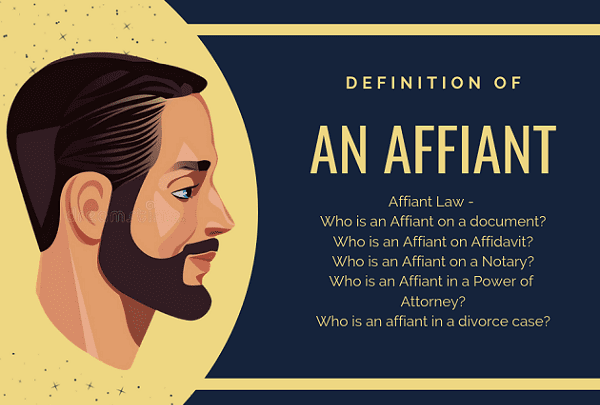Affiant – Definition of an Affiant – Affiant Law – Who is an Affiant on a document?
Affiant on Affidavit? - Explanation of an Affiant on several types of Affidavits

Definition of an Affiant
An affiant is simply defined as a person who files an affidavit.
In other words, an affiant is described as a person who owns the intellectual ability to swear or to take a vow under an oath and has correct knowledge of the all the facts presented in any legal proceeding in an affidavit.
Define Affiant Law
The affiant law states that an affiant in a legal term is used for a person who signs or takes an oath on an affidavit.
Who is an Affiant on a document?
An affiant on a document is a person who’s filing or signing an affidavit. Moreover, an affiant must possess the personal knowledge of the information written in an affidavit. In the case of a false statement, a person is subjected to the penalty of perjury.
Since an affidavit is a legal document, it must be signed and sealed by a notary to be effective. A notary is an individual who’s authorized by the government in order to verify the truthfulness of the information presented in the affidavit.
Who is an Affiant on Affidavit?
Before we move on to explain an affiant in the light of the law, let’s have a look at what exactly is an affidavit?
An affidavit is described as a voluntary document that has been written in the light of facts/truth by swearing under an oath in front of a notary.
Now, let’s us move on to who’s an affiant?
As described above, an affiant is an individual who signs an affidavit. Although there’s not age, race or gender discrimination for a person to be an affiant, yet, he/she must be old or mature enough to understand the significance of the validity of the facts presented in the affidavit.
Furthermore, a person is not considered incapable of signing or filing an affidavit even if he/she has a criminal conviction/record, however, an incompetent or immature person cannot sign of file an affidavit.
Besides, a person who’s well aware of the facts or information presented in the affidavit may act as an affiant, however, the authority of a person to verify the facts must be clearly given.
In addition, a guardian is allowed to sign or file an affidavit on behalf of a minor or mentally impaired person.
In certain cases, an attorney, a personal representative or a corporate officer is also allowed to sign or file an affidavit, if necessary.
Nevertheless, since an affidavit is described as a voluntary document, a court or an attorney or any authority is not allowed to force someone to sign an affidavit.
Who is an Affiant on a Notary?
An affiant is a person who signs the affidavit, however, a notary is a person in front of whom the affidavit must be signed by the affiant. Furthermore, a notary must also verify the facts of the affidavit by signing it and then sealing it. In fact, he’s a sort of witness for an affidavit as well as the affiant.
A notary is a legal term although a notary may resemble an attorney, he owns fewer rights than an actual attorney.
Who is an Affiant in a Power of Attorney?
Power of Attorney (POA) is described as a legal document that allows an individual to appoint someone to make decisions for him/her, in the following cases:
- In case a person is sick, or admitted to a healthcare facility, and can’t make decisions for himself/herself.
- In case a person has lost the mental capacity to make decisions for himself/herself.
- In case a person doesn’t want to make his/her own decisions.
In this way, a power of attorney affiant is defined as a person who’s allowed to sign an affidavit on someone’s behalf. In fact, a power of attorney affiant is a person who’s granted the power or authority to act for a given principal.
Who is an affiant in a divorce case?
Divorce is considered as a difficult time for all the involved participants. However, in this tough time, people are often left wondering if their voice will be heard by the legal authorities like a judicial or a local court or not or whether or not they’ll be able to earn the credence they deserve because, after all, they didn’t bring the case to the court.
In the case of a divorce, an affiant is usually the person who’s filing the complaint. However, all the participants have a right to be heard and to sign an affidavit.




